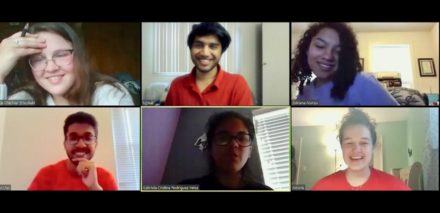Reaching Gen Z through COVID-19

By Sharon Mager
Trying to reach that young ‘Millennial Generation’? Here’s something to keep in mind – they’re not that young anymore. The oldest millennials are nearing that big 40 mark. According to Pew Research, people born between 1981-1996 are millennials and anyone born from 1997 onward is a part of a new generation — welcome “Generation Z.”
A diverse and driven generation
The ethnically and racially diverse Z crop just hit the college scene three years ago. “Before this, we were considering the millennials. It’s a hard switch, but we are adjusting,” said Baptist Convention of Maryland/Delaware (BCM/D) University of Maryland Collegiate Minister Jessica Senasack.

Gracie Brinsfield (upper left) leads an online investigative Bible study.
Generation Z hasn’t been the subject of as much discussion or study as the prior generation, but there are notable differences, strengths, and weaknesses that make it a unique and fascinating group of young people. Many are delighted to find that today’s teenagers and college students are driven and focused on finishing school strong and getting a practical and lucrative job. They’re on target to be the most educated group of young adults yet. A struggle that arises naturally from this type of drive and focus, however, is a high level of anxiety.
In 2018 the American Psychological Association reported that Gen Z, America’s youngest adults, are the most likely of all generations to report poor mental health. Gen Z is also significantly more likely to seek professional help for mental health issues.
Senasack realized the shift in the fall of 2018. “We used to take 17 to fall retreat and that year it was five.” Looking back over the past few years, she said she was surprised to see the numbers dwindle to seven in 2016 and thought it was a fluke. Then just five signed up for the retreat in 2017 and again in 2018. After sharing with other campus ministers Senasack discovered they too were experiencing this shift. This is now the new normal as the Gen Z students are less likely to show up for gatherings because they are already overcommitted and mentally stretched thin.
Nathan Walters, BCM/D collegiate ministry consultant and director of Baptist Student Ministry (BSM) at the University of Delaware, is also seeing the change. “Their number one concern in life is, ‘I need to graduate and do perfect in school so I can get the job.’ Even for Christian students, school comes way above anything else. I graduated in 2014 and I understand the drive, but I look at some of them and say, ‘You guys got to chill out a little bit,’” Walters said. “Anxiety has been growing and I believe social media contributes greatly to that.”
Walters chuckled and said even though he’s not too many years out of college, he still can’t keep up. “I don’t understand half of the social media going on. Every day there’s something new.”
The good news is that while collegiate leaders don’t have big numbers in the large group meetings, one-on-one sharing is flourishing.
In discussions with student leaders, Senasack discovered, as a whole, they were having great Gospel conversations with their friends and other interested students in a variety of times and places, such as at 2 a.m. at Denny’s.
“We made a list in October of every student who we’ve shared the Gospel or prayed with on a regular basis – roommates, close friends, specific people — and we came up with over 80 names. All of a sudden instead of reaching 20 we are actually reaching nearly 100. That changed our mindset. It let us see who we are really impacting on campus. Christian students are not showing up as much, but they’re faithful about reaching out to their friends.” Using that information, leaders became intentional in the spring and started a new list, and this time it contained 110 names.
Outreach and Discipleship in the midst of COVID-19
Over winter break, the BSM leadership team was read a book together: “The Fuel and the Flame – Ten Keys to Ignite Your College Campus for Jesus Christ.” It referenced investigative Bible studies that CRU and other groups use. “If it doesn’t lead to a decision to follow Jesus, it introduces them to who Jesus is from the Bible,” Senasack explained.
The leaders weren’t getting much response to the study, as the students were just too busy — until the COVID-19 restrictions came into effect. Suddenly students had more time.
Using Zoom, a group of four students who were spiritually searching and three student leaders began working through the investigative Bible study material online, including a young woman, Gabby, who made a profession of faith and is in a discipling relationship.
Another UMCP student, Ke, grew up in a communist atheist country and has not yet made a decision to follow Jesus, but the spirit of God is slowly opening her eyes and she is searching and asking many questions.
Gracie Brinsfield, an agricultural science and technology 2020 graduate and member of First Baptist Church of Hurlock, has been leading an investigative study.
“I would definitely say the group is engaged,” Brinsfield said. Her Bible study draws a diverse group of students — several young, talkative upperclassmen from India who love asking questions and sharing their thoughts and some quieter undergraduates who are more reserved but still ask clarifying questions.
When asked about Generation Z, Brinsfield confessed that it’s hard to comment on since she’s in that group but she does see the issues with busy schedules. “People are less willing to commit to something, like our large group. I think they’re not necessarily prioritizing groups besides school,” she said.
Sharing about her own experience, Brinsfield said, “Coming from high school I wanted to be involved in a Baptist church and a Baptist student group when I got to college. I talked to my pastor (Lee Hughart) and he looked up Jess [Senasack] and gave her my contact information and I met her at orientation. I started [with BSM] as a freshman and it has been a good time.” She attends Aletheia Church in College Park while on campus.
Whether reaching Gen Z, or millennials, Brinsfield said it ultimately comes back to relationships. “It’s kind of this weird cycle. Once you show up, you make friends and want to come back — making friends is a good experience. But people don’t want to show up if they don’t know other people,” she said. “They have to know that people genuinely care.”
Looking ahead
According to a June 30 Baltimore Sun article, Maryland colleges will be operating primarily in a hybrid model of both online and limited classes on campus with social distancing requirements. Some are opening earlier and shortening semesters or shifting to all online classes after Thanksgiving. The University of Delaware will begin offering classes on campus on September 1, but will transition online for the remainder of the semester after Thanksgiving.
Regarding the University of Delaware, and the uncertainty and potential for changes in the schedule due to COVID-19, Walters said the BSM plans to be mostly virtual and have students meet together in smaller groups. “If possible, we plan to hold our regular large group and small groups with guidelines in place, but we are prepared for the university to pivot at any moment.”
“When the pandemic hit, we were able to do all of our normal ministry meetings. We just did them virtually instead of in-person,” said Senasack. “This fall, we will most likely have some combination of the two. But the pandemic didn’t stop us from doing ministry, even for a day, and I don’t expect that to be any different going forward …”
Your Cooperative Program giving supports collegiate ministry. BCM/D collegiate ministers encourage young Christians, develop leadership, and work with student leaders to share the Gospel and to disciple other students. Lives are forever changed. Read more about collegiate ministry here.
